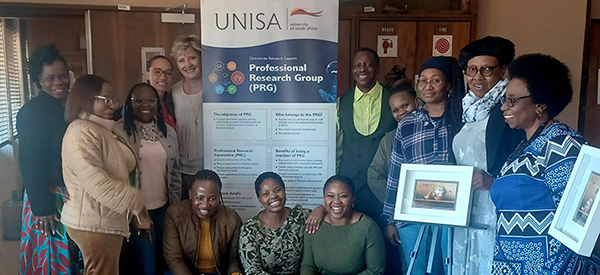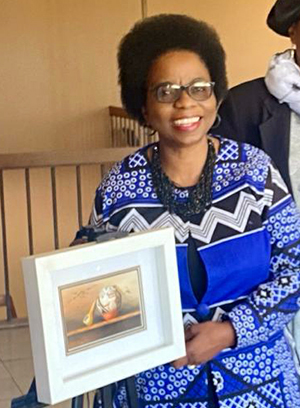Research
Cultivating well-being: Unisa's Professional Research Group showcases innovative research
Unisa's Research and Innovation (R&I) Week took a significant leap forward as the Professional Research Group (PRG) from the Directorate of Research Support (DRS) showcased the exceptional work of three of its distinguished researchers. Held on 21 May 2024, this event featured the university's dedication to fostering a culture of innovation and research excellence.

Professional Research Group members with guest speakers
The PRG workshop provided a platform for in-house researchers to present their innovative projects and research initiatives, primarily focusing on the health and well-being of the university's professional and support staff. Through a blend of virtual and onsite presentations, a broader audience can engage with innovative research. Attendees were exposed to a range of research endeavours led by three PRG members. These projects aimed to promote research for the betterment of society, explicitly addressing issues related to "burnout" and "well-being" prevalent during these turbulent times post-Covid-19. The researchers highlighted the challenges faced by PRG members and proposed viable solutions to tackle these pressing issues, reflecting a commitment to contributing positively to the current societal landscape.
Programme Director, Dr Thelma Louw, welcomed the guests and shared with the attendees the importance of R&I Week in bringing together the university's brightest minds to tackle pressing issues. Louw emphasised the role of collaborative research in driving positive societal impact and fostering a supportive research environment.
Amisha Benode, PRG's Programmes and Projects Officer, contextualised the Professional Research Committee and Professional Research Group's theme and purpose by reflecting on its objective and aim towards supporting the professional and support staff to conduct and publish research. "Our goal at PRC is to empower our professional and support staff by providing them with the tools and platforms to pursue their research interests. By doing so, we enhance their professional growth and contribute to the broader research community and society at large," she said.
Soul suffering of staff
Hugo van der Walt broke the ice by sharing with the audience the research undertaken by the institution on staff burnout. His research was very elaborate and painted a realistic picture of the soul suffering of staff. His presentation included understanding burnout, in which he focused on identifying the root cause of burnout among university staff, offering practical strategies for prevention and recovery. "This research is particularly relevant due to the increased stress and workload at the university."
Women breaking the glass ceiling

Dr Vuyokazi Sigaqa with a copy of the Women Breaking Glass Ceiling book.
The following presentation by Dr Vuyokazi Sigaqa unpacked the theme of Women breaking the glass ceiling, which was authored by Unisa Women's Forum members under the stewardship of Prof Meahabo Magano, Executive Director: Department of Tuition Student Facilitation and Learning (DTSFL). She said the book project was a response to Unisa's Vice-Chancellor, Prof Puleng LenkaBula's call by the Department of Higher Education and Training (DHET) to pioneer the fight against Gender-Based Violence and Femicide (GBVF) in higher education institutions. Magano added to the objectives of the publication by reflecting on highlights of stories of women that outline barriers to their career advancements, which are backed by empirical research. The book depicts stereotype narratives that are still prevalent against women's positive minds and potential to lead.
The book features 18 authors investigating the unspoken rules and obstacles hindering women's career progression. Each chapter is supported by published international research studies, exploring the subtle "speed bumps" not explicitly defined in policies, yet which significantly impede women from accessing leadership roles. These invisible barriers relegate women to the lower ranks of workplace hierarchies, confining them to the perceived role of homemakers rather than empowered professionals. "The authors investigated the glass ceiling at institutions of higher learning, the business world, industries and how the glass ceiling affects widows in the African cultural setting," said Sigaqa.
Reclaiming African communities
Dr Daniel Mosako, who introduced their ongoing study with Sigaqa on Reclaiming African communities: Breaking the cycle of pain amongst male students in an Open Distance eLearning (ODeL) institution, tied the presentation to the "glass ceiling" narrative.

Prof Meahabo Magano standing behind a mini art exhibition curated by Dr Daniel Mosako
He outlined that their research aims to educate young men on management strategies to deal with juxtapositions of career and family life matters and curbing the Gender-Based Violence (GBV) scourge prevalent in higher education and the world. He emphasised that their research dispelled the myth that "Indoda ayikhali" as men, too, are vulnerable human beings.
Concluding the session, Sigaqa and Mosako pioneered their research work and academic prowess in art and well-being, focusing on emotional and spiritual well-being. They further outlined the guidelines they have developed towards promoting young men's health and well-being based on Ubuntu's ethos as elements that can be incorporated into corporate wellness programmes, making them perfect beacons to guide the attendees through the healing journey. Thus, overcoming psychosocial obstacles may hinder a PRG member's progress at work and home.
In response to the Q&A session on implementing these guidelines to reach the broader community and benefit the broken society, they expressed that they harvest data by conducting men's workshops, which also accommodate women and the Lesbian, Gay, Bisexual, Transgender, Queer/Questioning, Intersex and Asexual (LGBTQIA)+ community in their sessions, as they believe that human beings co-exist in the ecosystem of life. They further remarked that the data collection challenges men's openness to the subject matter. They alluded that they aspire to reach out to a broader audience.
A mini art exhibition curated by Mosako was staged at the venue's foyer alongside the Women breaking the glass ceiling book display.
Unisa's R&I Week, highlighted by the PRG's showcase, featured its role as a beacon of research and innovation. Focusing on critical health and well-being issues, the PRG addressed immediate concerns and paved the way for a healthier, more resilient research community. As we progress, research initiatives will undoubtedly play a crucial role in shaping a better future for all.
* By Dr Vuyokazi Siqaga, Dr Daniel Mosako and Amisha Benode
Publish date: 2024/06/06

 Unisa co-hosts G20 community outreach in the Eastern Cape
Unisa co-hosts G20 community outreach in the Eastern Cape
 Unisans gain membership of prestigious science academies
Unisans gain membership of prestigious science academies
 Advocating for disability transformation through servant leadership
Advocating for disability transformation through servant leadership
 Unisa Press continues to illuminate the publishing space
Unisa Press continues to illuminate the publishing space